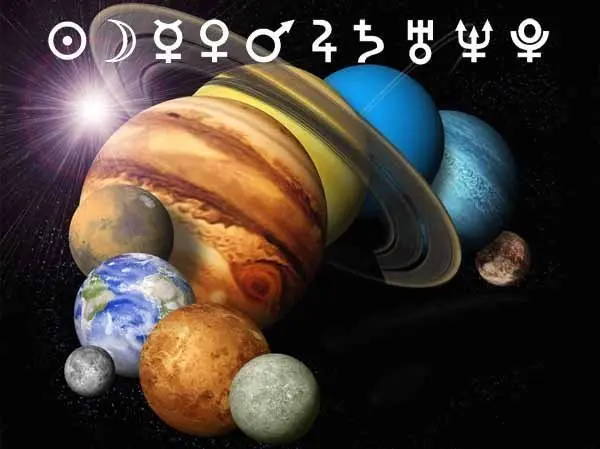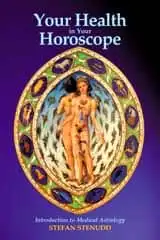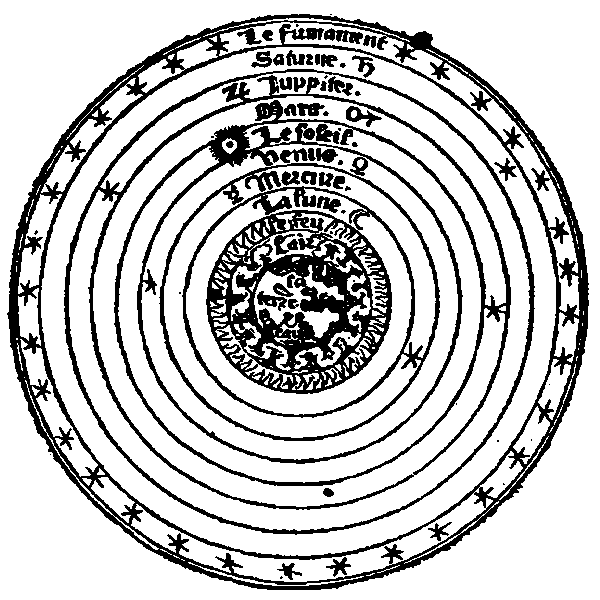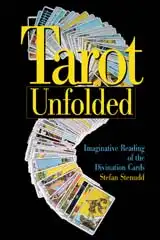|
by Stefan Stenudd
|
The Planets in the Complete HoroscopeInner Powers in Classical Astrology
Not all of those objects that group as planets in astrology, are actual planets in an astronomical meaning. The sun and moon are included. Also included are the Ascendant and the Medium Coeli, although they are no celestial bodies at all. The Ascendant (AC) is the rising point of the Zodiac on the eastern horizon, which is why it is also called Rising, and Medium Coeli (MC) is the highest point of the Zodiac, therefore also called Midheaven. They have their counterparts in the Descendant (DC) and the Imum Coeli (IC) — at exact opposite sides of the Zodiac. There are also the moon nodes, called the Dragon's Head and the Dragon's Tail, exactly opposite one another in the horoscope. Since the above components are all dealt with similarly in astrology and the horoscope, I allow myself to group them as planets. Some astrologers include additional points and celestial bodies. Anyway, the twelve most important planets and the characters of their forces are:
VelocitySome of the planets move as fast as one full rotation around the Zodiac in a day, and the slowest one needs almost 250 years to do the same. This is important to consider in the interpretation of a horoscope. The positions of the slower planets are shared almost by a whole generation of people, which is why they are called generation planets. The quicker ones can be said to be more personal, since they move significantly in a matter of days, in some cases hours.Here are the times it takes for them to make one rotation around the Zodiac, in round numbers — from a geocentric perspective, ie. as seen from the earth.
When interpreting a generation planet in the horoscope, it is more important what House it is in, than what Zodiac sign, since the latter is shared by all people born around that time.
RetrogradeBecause the perspecitve in astrology is geocentric — seen from earth — planets do at times seem to move backwards in the sky. This movement is called retrograde, and is the result of earth's own movement. In the horoscope, planets that are in retrograde are marked out as such, since this is taken into consideration in the interpretation of the horoscope.Generally speaking, retrograde planets are weakened and their force becomes more subtle and complex.
Astrological charactersIn reality more than in astrology, the sun and moon stand out from the other planets. In the horoscope, all planets are significant and active in their separate ways — not at all shaded by sun and moon, the way they are in the sky to the naked eye.How the planets were given their respective astrological characters (as listed above) is buried in the past. Any astrologer would like to regard it as a development of trial and error — that experience taught astrology the meanings of the planets. Seven of the planets are visible to the naked eye — the sun, the moon, Mercury, Venus, Mars, Jupiter and Saturn. The outer planets were only discovered after the invention of the telescope, and quite late at that — Uranus in the 18th century, Neptune in the 19th and Pluto in the 20th. The meanings of these planets in the horoscope have largely been deducted from the times of their discoveries.
The heavenly spheres. Illustration from a 16th century book by Bovillus.
RulersPlanets are traditionally said to rule over Zodiac signs, in which they are enforced by the character the sign gives them. A planet rules over the Zodiac sign where it fits better than other planets do. It should not be stressed too much in horoscope interpretation, since that enforcement is evident in itself, when the planet's kind of force and the Zodiac sign's character are combined.Only true celestial bodies can be rulers of Zodiac signs. Since there are just ten of them, and the Zodiac contains twelve signs, two planets rule two signs each. Astrologers agree on most, but not all, of the rulers. Here are the planets and the signs where I would say they rule:
ExaltingThe planets are also said to exalt in Zodiac signs — that is where they are enforced, but not to the extent they are in the signs they rule. Again, this should not be emphasized in horoscope reading, and again astrologers are of slightly differing opinions. Here are the signs in which I would say the planets exalt:
SymbolsThe symbols used for the planets are the same in astrology and astronomy. I have made ink brush versions of those symbols, just for fun. Here is a more strict rendering of them:
Planet symbols (glyphs). From left to right: sun, moon, Mercury, Venus, Mars, Jupiter, Saturn, Uranus, Neptune, Pluto, Ascendant, Medium Coeli, moon node.
The PlanetsHere are the planets and other celestial points mostly used in astrology, with links to the webpage of each:
MenuCOMPLETE HOROSCOPEHow to Make Your Own HoroscopeYour Health HoroscopeSex in Your HoroscopeZodiac ArchetypesFinancial AstrologyDaily Horoscope Guide — What to ExpectTetrabiblos — the Ancient Astrology BibleHOROSCOPE BASICSZodiac — the "how" of the horoscopePlanets — the "what" of the horoscopeHouses — the "where" of the horoscopeAspects — the "why" of the horoscopeFAMOUS HOROSCOPESDonald Trump — 2025 inauguration horoscope2024 presidential election horoscope for Kamala Harris2024 presidential election horoscopes for Donald Trump and Joe BidenJoe Biden's 2020 presidential election horoscopePete Buttigieg's 2020 presidential election horoscopeDonald Trump — impeachment horoscopeDonald Trump — will he resign?Hillary ClintonMike PenceBarack ObamaAnders Behring BreivikMichael JacksonSarah PalinBrad PittThe USA Horoscope — Finding and Reading ItPREDICTIONSThe USA Pluto return 2022 horoscopeCapitol attack horoscopeCovid-19 coronavirus horoscopeFuture of the InternetThe Age of AquariusUSA 2016 ElectionMundane Pluto — Its Effect on SocietyMundane Neptune — Its Effect on the ArtsMISCAbout the Complete Horoscope WebsiteDisappearing Ascendant — Latitude EffectsThe Envelope Chart — Horoscope of the PastAstrology LinksAstrologi på svenskaContactCookiesZODIAC SIGNSThe twelve Zodiac signs and what they mean in astrology.
MY OTHER WEBSITES
Tarot Card Meanings
I Ching Online
Stefan Stenudd
About meI'm a Swedish astrologer, author and historian of ideas, researching ancient thought and mythology. My personal website: stenudd.com
|
|||||||||||||||





